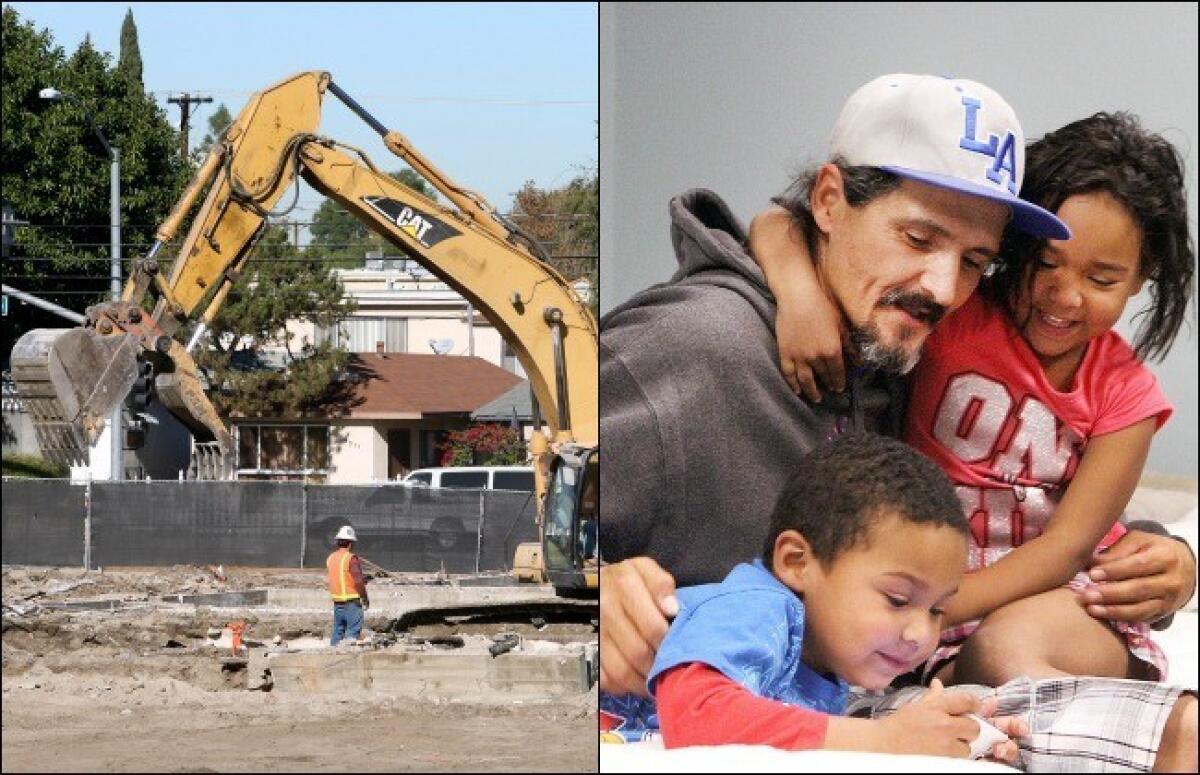Start the Presses: Property and social justice

Left: Demolition continues at 3413 W Olive Ave. Right: Gilbert Camacho, with his children Amellio, 4, and Olyvia, 5, sit on an inflatable bed in the room they are staying in at Glendale Presbyterian Church as part of Family Promise of the Verdugos on Wednesday, November 4, 2015.
Today’s online and print editions mark our fourth special, single-issue focused issue of 2015. You asked for more in-depth, enterprise work and we delivered. Literally.
Our pieces look at the nexus between property, poverty and community. The high quality of our schools drive up home and rental prices — which is fine as long as own your home. What does that mean for those on the edge?
Our staff looked at the owners of land in our cities and how development has changed the personality of our communities, both for good and ill.
Increased rent, for instance, impacts the poor much more than the middle class. The city of Los Angeles approved raising the wage to $15 an hour by 2020. County officials approved a similar measure for its government employees and for private employers in unincorporated areas.
In short order, Burbank and Glendale employers will be surrounded by areas required to offer workers a higher starting wage than they do. Given that our cities are generally more expensive to live in, this seems unjust.
I have previously called on the councils of the Jewel and Media cities to follow suit on this social justice issue. I raise the challenge again.
According to the federal Department of Labor, previous increases to the minimum wage have not — as opponents claim — increased unemployment, hurt small businesses or been bad for the economy. Instead, research shows higher wages reduces turnover — which is, by the way, expensive — and has little to no effect on unemployment rates or the larger economy.
It does have a huge effect on those making the minimum, however, particularly the ones who are parents. The story of the Camacho family in the paper today is an example of a family that could use a raise. They are just hanging on, and a boost could allow this family to stay in Burbank and raise their three children in BUSD schools. It seems only fair.
I will admit that the correlation between the minimum wage and housing costs is very much in dispute. Some argue that an increased minimum allows landlords to simply increase the rent, meaning families living on the edge would, in real dollars, not be any better off.
The argument goes that the only thing that would change this would be additional housing for lower income families and individuals. Unfortunately, I do not see the will to make this happen locally, given a studio at a downtown Glendale complex can set you back $2,000 a month.
But the other side of this issue argues that not providing a wage increase ignores the real reason for a bump.
White-color workers get raises because their employers believe those employees have a skill set that would be difficult or expensive to replace. The cost of the raise is more than balanced out by increased stability.
But in minimum-wage jobs, workers are often treated as highly replaceable units, sometimes no better than a machine. The cost of replacement is low, and the labor pool is large enough that there is no incentive to look out for those employees’ very real human needs.
In the absence of market forces compelling employers to look out for such people, society as a whole and communities in particular need to step in. It’s a social justice issue, and our local leaders need to see that.
--
DAN EVANS is the editor. He can be reached at (818) 637-3234 or dan.evans@latimes.com.
